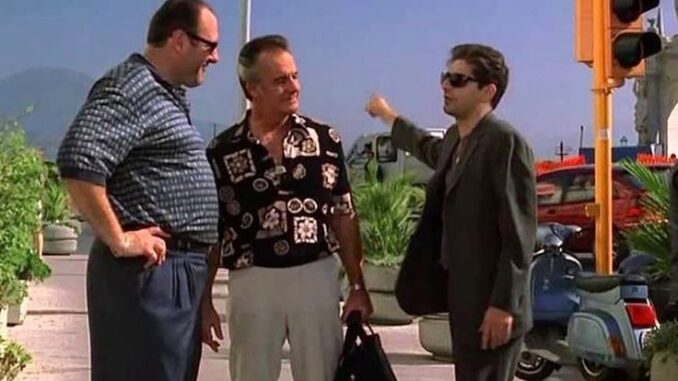
“The Sopranos” Named Greatest TV Show of All Time by Rolling Stone
When Rolling Stone recently declared The Sopranos the greatest television show of all time, fans and critics alike celebrated the achievement of a show that forever changed the landscape of TV. But what makes The Sopranos stand out among the countless other iconic shows that have come and gone? From its raw portrayal of family dynamics to its complex depiction of a mob boss navigating the pressures of modern life, The Sopranos wasn’t just a hit — it was a cultural revolution. In this article, we’ll explore why The Sopranos earned this prestigious title, how it influenced the TV industry, and why it still resonates with viewers today.
A Legacy of Revolutionizing Television
The first time The Sopranos aired in 1999, it was a game-changer. At a time when television was primarily focused on episodic, formulaic programming, The Sopranos introduced a new wave of storytelling that blended the complexity of film with the serial format of TV. Created by David Chase, the show broke all the rules of traditional television, paving the way for a more nuanced and sophisticated approach to character development, plotlines, and production values.

This revolutionary approach is one of the key reasons The Sopranos has been celebrated as the greatest TV show ever. The show offered viewers an intense, raw look into the lives of its characters, blending drama, dark humor, and moral ambiguity in a way that was unprecedented at the time.
Breaking the Mold: A New Era of TV Drama
Prior to The Sopranos, TV shows were often relegated to being a form of entertainment that didn’t receive the same respect as cinema. But The Sopranos changed that perception, ushering in an era where television became a medium for high-quality, cinematic storytelling. The complex character arcs, layered themes, and thought-provoking narrative choices of The Sopranos raised the bar for all TV dramas that followed. It influenced a generation of writers, producers, and directors, all striving to replicate its success and depth.
The Complexity of Tony Soprano: A Mob Boss Like No Other
At the heart of The Sopranos is Tony Soprano, played brilliantly by James Gandolfini. Tony isn’t just a mob boss — he’s a deeply conflicted character struggling with his identity, his emotions, and his moral compass. What sets Tony apart from typical TV protagonists is his complexity. On one hand, he’s a ruthless crime boss who runs a multi-million-dollar criminal empire. On the other, he’s a family man, trying to keep his wife, children, and extended family together while battling anxiety and depression.

Tony’s vulnerability, juxtaposed with his violent tendencies, made him one of the most compelling characters in TV history. His character embodied the struggle between personal desire and responsibility, making him relatable, even in his darkest moments.
The Sopranos and Its Groundbreaking Narrative Style
The Sopranos wasn’t just revolutionary in terms of character development; it also changed how stories were told. The show often used dream sequences, flashbacks, and non-linear storytelling to explore the inner lives of its characters. These techniques gave the show a layered and psychological depth that was rare for television at the time.
The show’s narrative structure was ambitious, with episodes often ending in ways that left the audience questioning what they had just witnessed. This unpredictability kept viewers on the edge of their seats, waiting for the next twist in the story.
Redefining the Antihero: The Birth of the Modern TV Hero
Before The Sopranos, antiheroes were largely confined to literature and film. But Tony Soprano’s character blurred the line between good and evil in a way that had never been seen before on TV. His flaws, such as his violent tendencies and moral contradictions, made him an antihero for the ages. Tony’s journey was never about redemption; rather, it was about navigating the darkness within himself while balancing his personal and professional life.
This portrayal of the antihero became a blueprint for countless characters in modern television. Shows like Breaking Bad, Mad Men, and The Wire owe much of their success to The Sopranos’ innovative approach to character-driven storytelling.
A Deep Dive into Family and Dysfunction
Another reason The Sopranos is widely regarded as the greatest show of all time is its exploration of family dynamics. The Soprano family isn’t just the backdrop of the show; it’s the core of the narrative. Tony’s relationship with his wife Carmela, his children Meadow and AJ, and his mother Livia provides a rich tapestry of drama, tension, and emotional complexity.
The portrayal of family in The Sopranos is far from idealistic. Instead, it’s raw, messy, and real. Tony’s struggles to balance his role as a father, husband, and mob boss echo the complex realities of family life, making it relatable to viewers.
The Sopranos’ Impact on TV and Pop Culture
The influence of The Sopranos extends far beyond the television screen. It has left an indelible mark on pop culture, with quotes, scenes, and characters becoming iconic. Tony Soprano’s “therapy sessions” with Dr. Jennifer Melfi (played by Lorraine Bracco) became a symbol of the show’s deep dive into the psyche of its protagonist, while the show’s opening theme song, “Woke Up This Morning” by Alabama 3, remains instantly recognizable.
Moreover, The Sopranos also changed the way TV shows were produced and consumed. It played a key role in the rise of binge-watching, as audiences eagerly awaited each new episode to unravel the story.
The Legacy of The Sopranos: Shaping TV for a New Generation
The legacy of The Sopranos can be seen in virtually every corner of modern television. It set the stage for the “Golden Age of Television,” where shows like The Wire, Mad Men, and Breaking Bad could flourish. These shows, often described as “prestige television,” share many of the qualities that made The Sopranos so groundbreaking, such as deep character studies, complex storylines, and a willingness to explore difficult subjects.
The show’s influence on contemporary television is undeniable. Without The Sopranos, it’s hard to imagine the success of today’s TV dramas, which often employ similar narrative techniques and character-driven stories.
Why Does “The Sopranos” Still Matter Today?
Even years after its finale, The Sopranos continues to be relevant. Its themes of family dysfunction, moral ambiguity, and the challenges of modern life resonate just as strongly today as they did when the show first aired. The way it portrayed the tension between personal ambition and familial duty remains a universal struggle, making it timeless.
The Sopranos and the Rise of Streaming Platforms
As streaming platforms like HBO Max, Netflix, and others continue to dominate the entertainment landscape, The Sopranos has seen a resurgence in popularity. New generations of viewers are discovering the show, and its relevance in the digital age is undeniable. The ability to binge-watch the entire series in one sitting has introduced The Sopranos to a new audience who might not have had the opportunity to experience it during its initial run.
Conclusion: A Landmark in Television History
The title of “Greatest TV Show of All Time” from Rolling Stone is not just a recognition of The Sopranos‘ success, but a reflection of its lasting impact on the television industry. From redefining the antihero to offering a brutally honest portrayal of family life, The Sopranos set new standards for storytelling that continue to shape the medium today. Its complex characters, innovative narrative techniques, and cultural significance have made it more than just a TV show—it’s a cultural touchstone. As the television landscape continues to evolve, The Sopranos will always stand as a monumental achievement in the world of entertainment.
FAQs
1. What made The Sopranos different from other TV shows at the time?
The Sopranos introduced a level of character complexity and narrative depth that was unprecedented in television. It broke away from episodic storytelling, offering long-term character arcs and a cinematic, layered approach to the narrative.
2. Why is Tony Soprano considered one of TV’s greatest characters?
Tony Soprano’s character is a compelling antihero—flawed, vulnerable, and deeply conflicted. His struggle to balance his criminal life with his family life makes him relatable and deeply human, which set him apart from typical TV characters.
3. How did The Sopranos influence other TV shows?
The Sopranos helped pave the way for modern TV dramas like Breaking Bad and Mad Men. Its complex characters, slow-burn storytelling, and focus on moral ambiguity became blueprints for future shows.